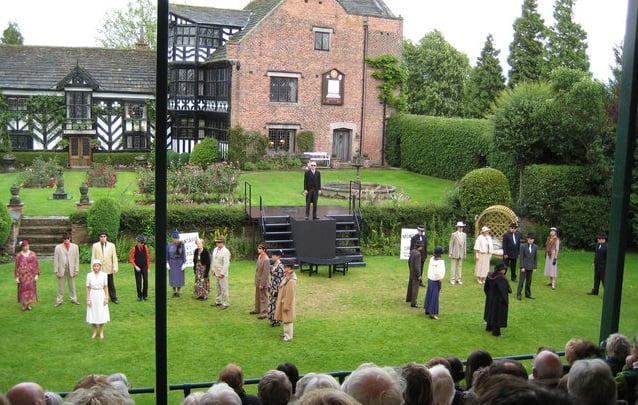
An open air performance at Gawsworth Hall in Cheshire
Photo: Peter Turner / CC BY-SA 2.0
Introducing ACE’s new investment principles
It’s not unreasonable to expect organisations funded by the public to be relevant to their communities and stakeholders, argues Simon Mellor.
In recent weeks you’ve heard from me on Arts Council England’s (ACE) three proposed outcomes in our next ten-year strategy. As our final consultation period draws to an end, I’d like to take you through the investment principles that we’re proposing will underpin the new strategy.
We must address the widespread lack of diversity and inclusivity within the cultural sector
At the Arts Council we take our role as stewards of public funding very seriously. That commitment to getting the best possible value for the public is at the front of our minds as we develop the new strategy.
We believe that one of the best ways of delivering on that is to invest in organisations that are well run, fit for the future and share our commitment to providing the best possible value to the public. We are therefore proposing to introduce three new principles that will apply to our investment, especially in relation to the National Portfolio – the group of organisations we provide with core funding over each investment period. The principles will also shape the way that ACE itself evolves over the next ten years.
We’ll expect the organisations we support in the National Portfolio to demonstrate the following three principles:
1. Ambition and quality
The pursuit of excellence is of paramount importance to us. We want organisations to be ambitious and committed to developing their creative potential so they can deliver work of the highest quality and match themselves confidently against local, national and international peers. We do not believe that certain types or scales of artistic activity are inherently of higher quality or value than others. Excellence can just as readily be found in a village hall as in a city centre concert hall, and it occurs in both the process of participation and in the work that is produced. Going forward, we’ll commit to backing organisations and individuals who have the potential to create excellence, as well as those already established at the top of their game.
2. Inclusivity and relevance
We want England’s diversity to be fully reflected across the organisations and individuals that we support and in the culture they produce. In 2011 we launched the Creative Case for Diversity. This has helped focus attention on the decisions that cultural organisations make about the work that they produce, present and collect. We must now build on this and address the persistent and widespread lack of diversity and inclusivity within the cultural sector – in its workforce, leadership, governance, visitors, participants and audiences.
I’m aware that the use of the term ‘relevance’ in relation to this Investment Principle has provoked comment. To be clear, of course we’re not going to be asking organisations to justify the relevance of individual works of art. We do, however, think that it is not unreasonable to expect organisations in receipt of the public’s money to be relevant – to ensure that the way they work, including their public programmes and other activities, is valued by their communities and stakeholders.
3. Dynamism and environmental sustainability
As we move through the next decade, we expect the challenges facing cultural organisations – pressures on funding, changes in tastes and habits, technological advances and the accelerating impacts of climate change and resource distress – to remain acute. To navigate this territory successfully, cultural organisations will need to become more dynamic and more environmentally sustainable.
We will support leaders with ambition to become more entrepreneurial and develop business models that help them maximise income, reduce costs and become more financially resilient. We’ll also take an active role in promoting a richer data culture and encouraging the adoption of new technologies. The cultural sector has already taken significant steps to reduce its carbon footprint. But we all need to go further and faster in reducing our environmental impact.
So how will these investment principles be applied in practice? We are now in the process of developing a framework that will be designed to enable organisations seeking regular funding to demonstrate both how they are currently performing against the three principles, and supporting them to set out what progress they expect to make over the next investment period. That work is being shaped by the extremely valuable feedback that we have already received via the consultation. If you haven’t already, do please go online before 23 September and give us your views.
Simon Mellor is Deputy Chief Executive, Arts and Culture at Arts Council England.
ArtsProfessional will be publishing ACE’s responses to questions from the sector on the new strategy in the coming weeks.
Join the Discussion
You must be logged in to post a comment.